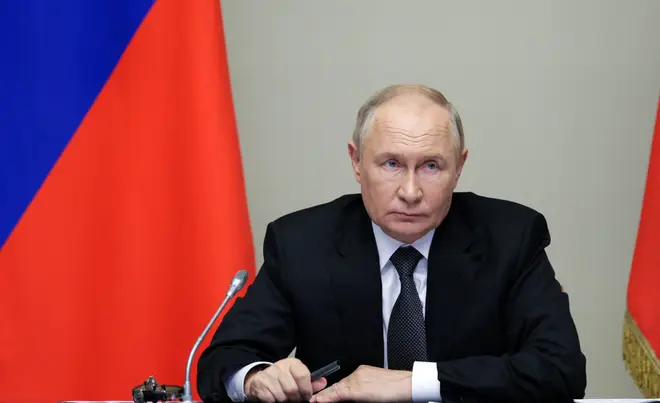
Matthew Wright 7am - 10am
14 August 2024, 09:52

A second Russian border region has declared a state of emergency, as Ukrainian troops continued their advance through the countryside.
The situation in the Belgorod region, directly to the south of the Kursk region where Ukrainian troops pushed into Russia over a week ago is "extremely difficult and tense", its governor said.
Vyacheslav Gladkov claimed that the Ukrainian army had killed and wounded civilians, and destroyed buildings in the Belgorod region. No reports have been confirmed of Ukrainian ground troops in the Belgorod region itself.
The progress of the Ukrainian army is disputed, with Kyiv saying it continues to advance, while Russia claims to have halted the opposition troops.
Ukraine claims that it controls 74 settlements after crossing over the border into the Kursk region, with around 1,000 square kilometres (386 square miles) now occupied.
Officials said that the army had made gains of 1-3 kilometres over the past 24 hours, with troops now around 30km inside Russia.
Read more: Ukraine not interested in occupying Russian territory after incursion, Kyiv says

Analysis by Russian opposition news outlet Meduza suggests that Ukrainian troops are now moving north and west from the town of Sudzha, the first significant town they encountered after crossing the border.
But they said they have not yet succeeded in taking control of the road from Sudzha to Kursk, the regional capital 77 miles away, which has a population of over 400,000.
Russia denied reports of a continued Ukrainian advance, with Major General Apti Alaudinov saying that Ukraine's troops had been halted and several villages around 28km (17 miles) from the border had repelled them. Alaudinov also denied that Ukrainian troops control Sudzha.
Moscow said that Kyiv had lost as many as 420 troops in the past 24 hours, out of a total of up to 2,030 since the incursion began.

Russia also claimed that Ukraine had lost 55 armoured vehicles in the past day and three tanks, out of 35 over the past week. These claims have not been independently verified.
Russian officials said their forces shot down 117 Ukrainian drones overnight, as well as four missiles. They said these were targeting regions deep within its territory, such as Voronezh and Nizhny Novgorod, as well as Kursk and Belgorod. Some local outlets reported that aerodromes in these regions had been targeted.

Ukrainian president Volodymyr Zelenskyy said: "Despite difficult and intense battles, our forces continue to advance in the Kursk region, and our state's 'exchange fund' is growing. Seventy-four settlements are under Ukrainian control."
Ukraine has said it launched the cross-border operation on August 6 with the aim of protecting Ukrainian land from long-range strikes launched from the Kursk region, rather than permanently occupying Russian territory.
But it appears for now that the Russian defence of Kursk is being carried out by local units, rather than soldiers already in Ukraine.
A group of parents of conscripts have said they were told their offspring were being deployed to Kursk, and Lithuania's defence minister Laurynas Kasciunas claimed that Russia was moving troops from Kaliningrad, its exclave region on the Baltic, to Kursk.

The incursion has had a noticeable impact on local people, with images of damaged buildings, and reports of mass evacuations.
Around 121,000 people have been moved from the Kursk region with another 59,000 told to leave.
Some 11,000 people were also evacuated from the Krasnoyaruzhsky district in Russia's Belgorod region with just 500 residents remaining.
The governor of the Kursk region said: "I'll tell it straight: the crisis has not yet been overcome".

Heorhii Tykhyi, a Ukrainian official, said that Russia had launched more than 2,000 strikes from the Kursk region in recent months using anti-aircraft missiles, barrel artillery, mortars, drones, 255 glide bombs and more than 100 missiles.
He said "the purpose of this operation is to preserve the lives of our children, to protect the territory of Ukraine from Russian strikes".
Ukraine's Western partners have said the country has the right to defend itself, including by attacking across the border.
Mr Zelenskyy said earlier: "Russia brought war to others, now it’s coming home. Ukraine has always wanted only peace, and we will certainly ensure peace.”
Meanwhile, Russian President Vladmir Putin has vowed to "kick the enemy out of our territory" and said the incursion would not distract from Russia's own war aims in Ukraine, which it invaded two and a half years ago.
In public, US president Joe Biden has only said the incursion "creates a real dilemma" for Putin.

Matthew Savill, military sciences director at the Royal United Services Institute, said Russia has been "severely embarrassed".
"The loss of territory and evacuation of civilians will play poorly back in Russia as evidence they 'can't defend themselves'," he added.
Putin has said the Kursk offensive appeared to reflect Kyiv's attempt to gain a better negotiating position in possible future talks to end the war.

"It's obvious that the enemy will keep trying to destabilise the situation in the border zone to try to destabilise the domestic political situation in our country," he added.
Putin said Ukraine had failed in its aim to destabilise Russia though and that Moscow's military must "dislodge" Ukrainian troops from border regions.
He previously described the move by Kyiv as a "large-scale provocation" that involved the "indiscriminate shelling of civilian buildings, residential houses and ambulances."
One of Putin’s governors accused Ukraine of chemical weapon use during the invasion - though it is unclear if he has provided any evidence.
Both countries have accused one another and reported allegations of use of chemical weapons during the war.
Zelenskyy spoke on the invasion for the first time over the weekend, saying that Russia deserved a "fair" response following its launch of nearly 2,000 cross-border strikes at Ukraine's Sumy region in recent months.